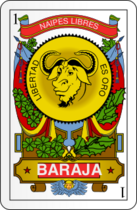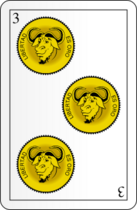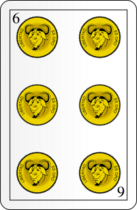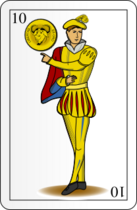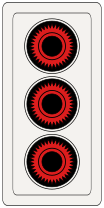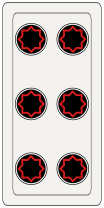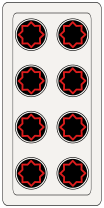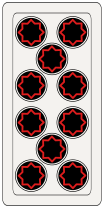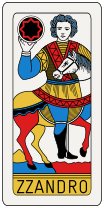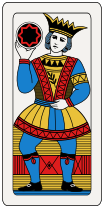
The suit of coins is one of the four
card suits used in Latin-suited
playing cards alongside
swords,
cups and
batons. These suits are used in
Spanish,
Italian and some
tarot card packs. This suit has maintained its original identity from
Chinese money-suited cards. Symbol on Italian pattern cards:
![]() Symbol on Spanish pattern cards:
Symbol on Spanish pattern cards:
![]() Symbol on French
aluette cards:
Symbol on French
aluette cards:
![]()
Lu Rong's (1436–1494) account of Chinese money-suited 38-card decks has the suit of coins as Cash with ranks one to nine. The ranks are in reverse order with the lower numbers ranking greater than the higher numbers. This features in many early card games like Madiao, Ganjifa, Tarot, Ombre, and Maw. By the late 16th-century, the suit of Cash added two more cards, the Half Cash and Zero Cash. During the 18th and 19th centuries, these two cards became suitless and took on new identities as the White Flower and Red Flower respectively. Mahjong tiles derived from money-suited decks in the middle of the 19th century. The Hakka's Six Tigers [ zh] deck, Vietnamese Tổ tôm and Bài chòi decks, Thailand's Pai Tai deck, and Malaysia, Singapore, and Indonesia's Ceki [ ms] or Cherki deck all maintain the Chinese money-suit of coins.
In Spain, the suit of coins is known as oros and the court cards are known as the rey (king), caballo (knight or cavalier) and sota (knave or valet). The Spanish play with packs of 40 or 48 cards. There are no tens and, in the shorter pack, the nines and eights are also dropped. Thus the suit of coins ranks: R C S (9 8) 7 6 5 4 3 2 1.
In Italy the suit is known as denari and the corresponding court cards are the re, cavallo and fante. Either 40 or 52-card packs are used. In the shorter packs, the tens, nines and eights are removed. Card ranking is thus: R C F (10 9 8) 7 6 5 4 3 2 1. [1] In the French vendée where they play aluette with a special pattern of 48 Spanish-suited cards, the suit is called denier and there are the courts are the roi, cavalière, (female cavalier) and valet (jack).
Portuguese-suited playing cards were traded to Japan in the mid-16th century which influenced the development of Karuta where the 48-card Komatsufuda and 75-card Unsun Karuta decks still maintain this suit.
The suit of coins is also one of the four suits in tarot card packs used for tarot card readings and other cartomancy.
The gallery below shows a suit of coins from a Spanish-suited deck of 48 cards. The pack is of the Castilian pattern:
-
2
-
3
-
4
-
5
-
6
-
7
-
8
-
9
The gallery below shows a suit of coins from an Italian-suited deck of 52 cards. The pack is of the Bresciane pattern:
-
2
-
3
-
4
-
5
-
6
-
7
-
8
-
9
-
10
The gallery below shows a suit of coins from a Mahjong set of 144 tiles. Also included are the red and white dragons:
-
Red Dragon
-
White Dragon
-
1
-
2
-
3
-
4
-
5
-
6
-
7
-
8
-
9
The gallery below shows a suit of coins from a Ceki deck of 60 cards. Also included are the red and white flowers:
-
Red Flower
-
White Flower
-
1
-
2
-
3
-
4
-
5
-
6
-
7
-
8
-
9
The image below shows a suit of coins from a Sichuan Six Tigers deck of 36 cards:
The image below shows a suit of coins from a Tổ tôm deck of 120 cards:
The image below shows a suit of coins from a Komatsufuda deck of 48 cards:
The image below shows a suit of coins from an Unsun karuta deck of 75 cards:

- Seven of coins. The seven of coins is the most valuable individual card in Italy's national game of scopa. Known as the sette bello ("beautiful seven"), capturing it is one of four achievements that earns a game point. [2]
- Ace of coins. In some Italian patterns the ace of coins is represented by an eagle.
- Spanish-suited playing cards
- Italian playing cards
- Coins – suit used in divinatory tarot cards
- ^ Parlett 2008, p. xv.
- ^ Parlett 2008, p. 410.
- Parlett, David (2008). The Penguin book of card games. London: Penguin. ISBN 978-0-14-103787-5. OCLC 229463734.

The suit of coins is one of the four
card suits used in Latin-suited
playing cards alongside
swords,
cups and
batons. These suits are used in
Spanish,
Italian and some
tarot card packs. This suit has maintained its original identity from
Chinese money-suited cards. Symbol on Italian pattern cards:
![]() Symbol on Spanish pattern cards:
Symbol on Spanish pattern cards:
![]() Symbol on French
aluette cards:
Symbol on French
aluette cards:
![]()
Lu Rong's (1436–1494) account of Chinese money-suited 38-card decks has the suit of coins as Cash with ranks one to nine. The ranks are in reverse order with the lower numbers ranking greater than the higher numbers. This features in many early card games like Madiao, Ganjifa, Tarot, Ombre, and Maw. By the late 16th-century, the suit of Cash added two more cards, the Half Cash and Zero Cash. During the 18th and 19th centuries, these two cards became suitless and took on new identities as the White Flower and Red Flower respectively. Mahjong tiles derived from money-suited decks in the middle of the 19th century. The Hakka's Six Tigers [ zh] deck, Vietnamese Tổ tôm and Bài chòi decks, Thailand's Pai Tai deck, and Malaysia, Singapore, and Indonesia's Ceki [ ms] or Cherki deck all maintain the Chinese money-suit of coins.
In Spain, the suit of coins is known as oros and the court cards are known as the rey (king), caballo (knight or cavalier) and sota (knave or valet). The Spanish play with packs of 40 or 48 cards. There are no tens and, in the shorter pack, the nines and eights are also dropped. Thus the suit of coins ranks: R C S (9 8) 7 6 5 4 3 2 1.
In Italy the suit is known as denari and the corresponding court cards are the re, cavallo and fante. Either 40 or 52-card packs are used. In the shorter packs, the tens, nines and eights are removed. Card ranking is thus: R C F (10 9 8) 7 6 5 4 3 2 1. [1] In the French vendée where they play aluette with a special pattern of 48 Spanish-suited cards, the suit is called denier and there are the courts are the roi, cavalière, (female cavalier) and valet (jack).
Portuguese-suited playing cards were traded to Japan in the mid-16th century which influenced the development of Karuta where the 48-card Komatsufuda and 75-card Unsun Karuta decks still maintain this suit.
The suit of coins is also one of the four suits in tarot card packs used for tarot card readings and other cartomancy.
The gallery below shows a suit of coins from a Spanish-suited deck of 48 cards. The pack is of the Castilian pattern:
-
2
-
3
-
4
-
5
-
6
-
7
-
8
-
9
The gallery below shows a suit of coins from an Italian-suited deck of 52 cards. The pack is of the Bresciane pattern:
-
2
-
3
-
4
-
5
-
6
-
7
-
8
-
9
-
10
The gallery below shows a suit of coins from a Mahjong set of 144 tiles. Also included are the red and white dragons:
-
Red Dragon
-
White Dragon
-
1
-
2
-
3
-
4
-
5
-
6
-
7
-
8
-
9
The gallery below shows a suit of coins from a Ceki deck of 60 cards. Also included are the red and white flowers:
-
Red Flower
-
White Flower
-
1
-
2
-
3
-
4
-
5
-
6
-
7
-
8
-
9
The image below shows a suit of coins from a Sichuan Six Tigers deck of 36 cards:
The image below shows a suit of coins from a Tổ tôm deck of 120 cards:
The image below shows a suit of coins from a Komatsufuda deck of 48 cards:
The image below shows a suit of coins from an Unsun karuta deck of 75 cards:

- Seven of coins. The seven of coins is the most valuable individual card in Italy's national game of scopa. Known as the sette bello ("beautiful seven"), capturing it is one of four achievements that earns a game point. [2]
- Ace of coins. In some Italian patterns the ace of coins is represented by an eagle.
- Spanish-suited playing cards
- Italian playing cards
- Coins – suit used in divinatory tarot cards
- ^ Parlett 2008, p. xv.
- ^ Parlett 2008, p. 410.
- Parlett, David (2008). The Penguin book of card games. London: Penguin. ISBN 978-0-14-103787-5. OCLC 229463734.
